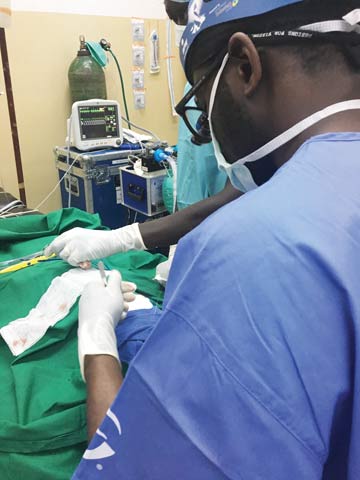April 25, 2024
Growing demand for anesthesia services at ASCs is being met with a dwindling supply of anesthesia providers....
This website uses cookies. to enhance your browsing experience, serve personalized ads or content, and analyze our traffic. By clicking “Accept & Close”, you consent to our use of cookies. Read our Privacy Policy to learn more.
By: Daniel Cook
Published: 9/1/2020
India Marshall underwent surgery on June 9 for the removal of benign bone growths in her forehead at the hands of surgeon Jewel Greywoode, MD, of Charlotte (N.C.) Eye Ear Nose and Throat Associates (CEENTA). As the surgical team prepped Ms. Marshall in the OR, Dr. Greywoode began to braid her thick, curly black hair near the surgical site. He's always careful to braid long hair to improve his access to the skull and reduce post-op infection risks. After surgery, braided hair makes it easier for patients to care for and clean wounds.
"It's what I normally do," says Dr. Greywoode, who does his best to move hair away from the surgical site without shaving it. "If the patient's hair is very thick and curly, as was the case with Ms. Marshall, it's especially important because braids protect the hair and prevent knots and tangles."
When Ms. Marshall removed her bandages two days after the procedure, she discovered more braids in her hair than she had before surgery and assumed they were the work of the nurses on her care team. It wasn't until her follow-up appointment with Dr. Greywoode that she learned he was the one who put in the braids.
"I saw what she had done to her hair to get ready for surgery and understood hair was important to her," says Dr. Greywoode. He had a sense of why he needed to preserve Ms. Marshall's hair because of the "braid nights" he spends with his two daughters, who also have thick, curly hair.
"Having my hair in braids made everything easier for recovery, especially because I have a lot of hair and wear it naturally," Ms. Marshall told CEENTA.
She had consulted with three other surgeons, who didn't discuss ways to preserve her hair, before deciding how to proceed with surgery. She told NBC's Today that she could have received that type of care only from a Black doctor who understood her as a Black woman.
Ms. Marshall's Twitter posts about the experience went viral with many people commenting on her messages that the story highlights the importance of having more diversity and representation in health care.
Dr. Greywoode says he's overwhelmed and appreciative of the attention he's received, but deflects some of the praise by emphasizing that he does the same thing for all of his patients with long hair.

Ms. Marshall's emotional response to the kind and thoughtful care he provided makes sense, according to Dr. Greywoode. "In some ways, though, it makes me sad," he says. "Part of the sadness comes from me having had several other patients tell me they were grateful I'm African American, and felt more comfortable with me. It's unfortunate some Black patients don't trust the physicians they see. I wish things were different."
Dr. Greywoode is also encouraged by Ms. Marshall's comments because they show him that what he strives to do for his patients on a daily basis comes across as caring and compassionate. "That's what I signed up for when I became a surgeon," he explains. "I'm glad to know my efforts are working."
The underrepresentation of African Americans in health care continues to be an issue and contributes to the ongoing mistrust of the nation's health system that many African Americans harbor, points out Dr. Greywoode. He acknowledges that systemic racism in medicine is a complex and layered problem, but says improving access to higher education for African Americans who want to become physicians is an important goal.
"This isn't about handouts," he says. "It's about making sure opportunities are available for those who want them."
Moving forward, Dr. Greywoode hopes conversations continue about how African Americans can receive quality care from all physicians. He's thought about the role he can play in keeping that dialogue going. "I can be the safe space for my colleagues who might hesitate to bring up race-related issues," he says. "If there's anything they want to talk about, I'm ready to have those discussions in an open and honest way."
"Being Black in America is a different experience — that's the reality," continues Dr. Greywoode. "We need to continue having these conversations and validating the experiences of all patients." OSM
Growing demand for anesthesia services at ASCs is being met with a dwindling supply of anesthesia providers....
Improvements in both workflow and staff attitudes are part of a leader’s responsibilities, but your interventions in these areas don’t need to be major to make...
The ASC market continues its rapid growth. In 2023, roughly 116 new ASCs opened in the U.S., many of which were orthopedic-specific in nature....